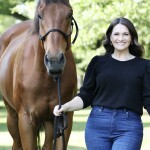Three years ago my mornings looked very different than what I experience now. In the past I had a rushed routine of waking up, feeding all the large and small animals on my mini-farm, then getting dressed and presentable for a day of meetings with a variety of business owners. Gage, my Thoroughbred, has a megaesophagus, so he stays on a strict liquid diet. He’s been eating his liquid slurp for 5 years now. Preparing his meals is more time consuming than traditional feeding practices in the barn.
Once his food dissolved in a mixture of hot and cold water I would walk his morning bucket to the gate and hang it there so I could watch him eat from out my window as I finished getting ready for the day. Before leaving for work I’d walk back to the gate, in my business attire, check his bucket to make sure he ate all his food, and take a solid glance over him to make sure he wasn’t having choking issues.
During this time Gage was experiencing fevers at least once a month from aspirating on his liquid food. If he did not finish his bucket, I’d start my sick horse protocol: take temperature, text the vet, text my manager at work that I was going to be late, give a dose of banamine, start SMZ antibiotics, wait an hour or two for the banamine to kick in, take temperature again, and offer a small amount of food once he started to perk up. These days I am pretty good at recognizing when he’s not feeling his best by how he stands in the pasture or in his stall.
If all was well and he finished his food, I’d hop in my car and set off for the office. I always rolled into the parking lot on two wheels, arriving much later than I needed to and feeling rushed from the get-go.
When the pandemic hit and we all went home to work my mornings slowed dramatically. I was not in such a rush to get every mouth on the mini-farm fed. Remote work allowed more flexibility in my schedule and cut out a 30-45 minute commute, depending on traffic. Although sheltering at home was fatiguing in its own way, the morning slow down was welcomed and I thought I may never transition back to office life 100% again.
My morning routine is very different now. For starters, I have a five-month-old daughter, but the rush I use to experience is a memory. I’m sure that will change as my daughter grows, but to be honest, my five-month-old baby is still easier to tend to than the choke-prone Thoroughbred who is always waiting in his stall for his morning slurp. Thankfully, his monthly fevers have subsided for now.
Today, I balance my time between my home office and the Horse Review office, visiting regional equine business owners, and having the freedom to do barn chores when I prefer. I did not change my career in journalism to have this new work-life balance. I just changed the niche I work in to the horse niche and it has enhanced my overall work-life balance.
As a young adult coming out of school, I knew I was going to maintain my horse obsession and hobby. I did think about going to veterinary school early in my college days, until I worked for a veterinary clinic. That work experience helped me decide it was best to keep horses as my hobby instead of a career. I felt I needed to establish a career outside of the horse industry to be able to afford horses. At the time I didn’t really know all the different types of careers there were available in the horse industry.
This issue focuses on the abundance of educational opportunities for youth, teens, and young adults, and how those educational programs help shape careers in the horse industry. If I could tell the younger version of myself anything, it would be that there are many career opportunities in the horse industry aside from being a horse trainer or large animal vet. Most importantly, there are lucrative specialty careers in Animal Science and Agriculture; many allow people to be around horses and livestock daily. These careers provide income to afford horses and enjoy a nice work-life balance between career and hobby.
My hope for this issue is to help our younger readers, parents, and anyone thinking about horse industry careers to know about the many opportunities available. My personal journey is an example of taking skills learned in a traditional four-year program and applying that education and experience to a specialized equine career. It may have taken me a while to shift my journalism focus to the horse industry, but the journey getting here has made me appreciate horses and the professionals in the industry even more.
- Lauren Pigford Abbott
Publisher & Owner









